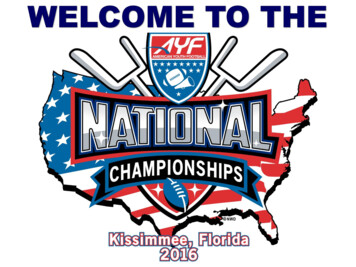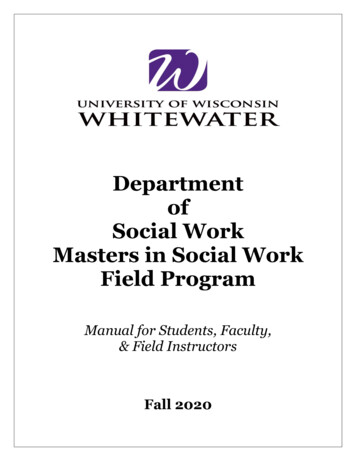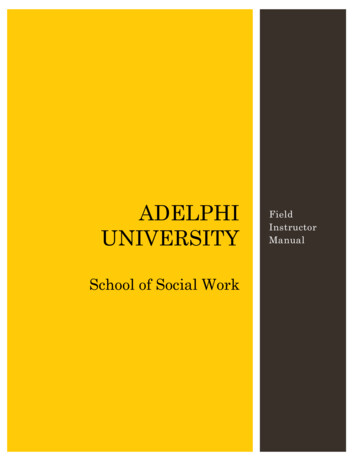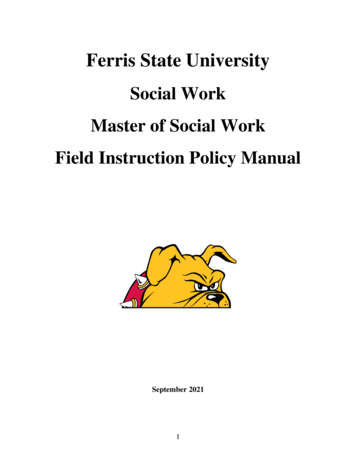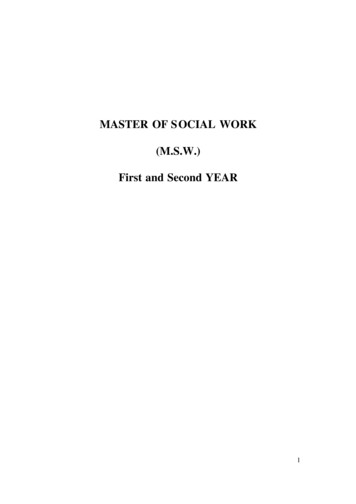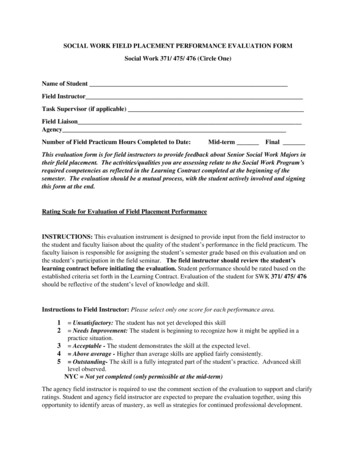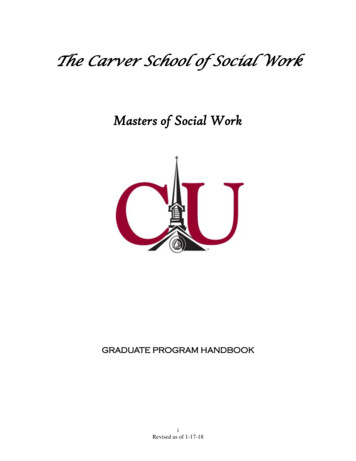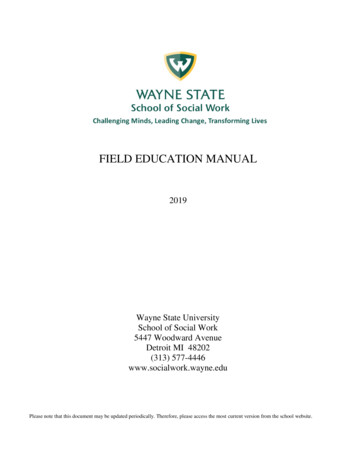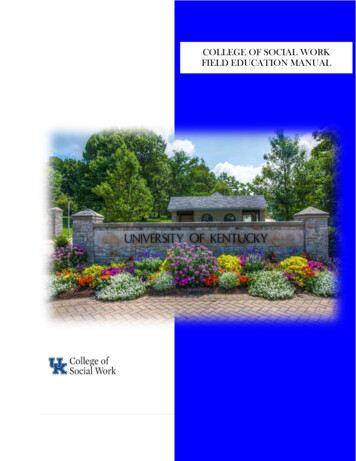
Transcription
FIELD MANUALINTRODUCTION: SOCIAL WORK DEPARTMENTForewordThe Social Work Department has prepared this manual to assist students, agencies, and fieldinstructors in understanding the objectives, policies and procedures governing field practicuminstruction for both the Bachelor of Social Work and Master of Social Work Program atAndrews University.Field IntroductionField practicum is the signature pedagogy of graduate social work education. Theory,information and concepts are applied and internalized in "field." The heart of an excellent socialwork program is the field practice experience. As with all things, practice improves ability.Without field education there would be no means of providing the guided practice needed toprepare BSW & MSW students to become advanced social work professionals. Our commitmentis to provide excellent practicum opportunities that support fulfillment of both the program andthe student's personal mission and goals.Departmental MissionThe Andrews University Department of Social Work, through excellence in teaching, research,and service, prepares students to be effective, knowledgeable, and qualified for practice in thetwenty-first century. Graduates will enhance individual and community well-being, celebratedifference, and promote social and economic justice for vulnerable populations. As a Seventhday Adventist Christian institution, we build and disseminate knowledge, values, and skills thatpositively impact the local and global communities; affirm faith by integrating Christiancompassion in action within generalist social work practice; and change the world throughenhancing the quality of life for all people by upholding the traditions, values, and ethics of thesocial work profession.Department Motto1Rev. 07/2020
The motto of Andrews University department of Social Work is to prepare individuals forexcellence during a lifetime of professional service and Christian compassion in action.Departmental Statement of PhilosophyWe, the faculty and students of the Andrews University Social Work Department, strive to be acommunity joined together in excellence, compassion and a desire to serve others. While eachstudent is not required to hold the following beliefs, our department strives to affirm thisphilosophy in the classroom, field and interpersonal interactions:We rejoice – In a personal, loving God who cares about all persons and gives us freedom of choice; In our capacity to be loving, joyful, spiritual human beings who were made in God’simage; In our ability to live in healthy relationships with God and our fellow human beings; In the privilege of interacting in communities where we can demonstrate God’s mercy,love, and healing; In the transformational power of the Gospel to renew us in the image of God.We affirm – That God loves all people, regardless of race, ethnicity, age, class, gender, sexualorientation, cultural background, religious belief, health status, ability, choice, or action; The life and example of Jesus, who modeled a life of compassionate service to others andsought to end institutional and social oppression and improve the lives of others in thehere and now; That people possess strengths and are resilient and deserving of love, respect, and selfdetermination; The core social work values of service, social justice, the dignity and worth of the person,the importance of human relationships, integrity, and competence.We lament – The personal, institutional, and social pain which humans inflict on one another, whetherrooting in power, religious intolerance (e.g. anti-Semitism), or secular philosophy; The injustice and violence which pervades our communities and our world; The fear and selfishness expressed in racism, sexism, classism, and discrimination in allits forms which separate us from one another; The exploitation of the earth and of its poor for economic gain;2Rev. 07/2020
The ways in which those with power attempt to impose their beliefs and will on thepowerless, whether because of religious or secular dogma, ignorance, ideology, orpersonal gain; The ways we fail to consistently demonstrate God’s message of peace, hope, impartialjustice, holistic healing, and unconditional love for all people and communities.We urge – Faculty to model compassion, personal and professional balance, Christian servantleadership, and excellence in teaching, community service and research; Staff to offer caring service and support in ways that empower students, faculty, andcommunity partners to achieve the mission of the department; Students to carry forward the department’s mission with professionalism, compassion,and dedication to preserving and healing all God’s creation; The entire social work department to demonstrate a commitment to excellence in practiceand maintain a commitment to life-long learning.Nondiscrimination Statement"Andrews University is committed to the same policy of nondiscrimination in education,research and all aspects of faculty, staff, student and alumni relations. All personnel policies,including all matters affecting compensation, benefits, promotions and employee discipline, areadministered without regard to race, color, creed, ethnic background, country of origin, age, sex,height, weight, physical handicap, marital status, political preference, gender, sexual orientationor past military service."-Andrews University BulletinDEPARTMENTAL GOALS Prepare competent, ethical, Christian social workers who are committed to integratingtheir faith with their social work practice to deliver evidence-based, effectiveinterventions to diverse client systems of various sizes, including clients in internationalsettings. Prepare students who are committed to utilizing research-informed professionalknowledge, values and skills to strengthen policy and practice effectiveness that willsupport and/or enhance the social and economic well-being of clients.3Rev. 07/2020
Prepare students to apply effective critical thinking skills for problem-solving andpromotion of social justice and human rights within a world of global diversity,difference, and oppressive forces that impact marginalized populations. Prepare students to identify and apply the content, context, and breadth of the humandevelopment and behavior experience within practice.Department Competencies & Practice BehaviorsThe Bachelor of Social Work (BSW) goals and the Master of Social Work (MSW) Foundationyear goals reflect the content as outlined in the Educational Policy and Accreditation Standards.They demonstrate the inclusion of all BSW & MSW Education Policy Accreditation Standards(EPAS) competencies and practice behaviors of social work and are consistent with theDepartmental mission. The goals provide that prior to the completion of the BSW or MSWFoundation year, students will demonstrate the following:Foundation Competencies and Practice BehaviorsThe BSW curriculum centers on preparing students for entry level professional practice oradmission into an MSW or other graduate program. While the MSW foundation-year curriculumcenters on preparing students for generalist practice, input from the practice community andconsultants has been helpful in framing, refining and adapting a solid theoretical generalistdefinition for developing foundation curricular objectives.By the time a student graduates with his/her BSW degree or enters his/her foundation year(MSW) practicum, he/she should be able to demonstrate broad-based, beginning levelknowledge, values, ethical decision making skills, and competence in using the generalistintervention model. Students are placed in agencies in which they are able to demonstrategeneralist knowledge, values, and skills in a variety of situations and with a variety of clientpopulations.DEPARTMENTCOMPETENCIES1. Demonstrate Ethical andProfessional BehaviorPRACTICE BEHAVIORS1a. Make ethical decisions by applying the standards of the NASW Code ofEthics, relevant laws and regulations, models for ethical decision-making,ethical conduct of research, and additional codes of ethics as appropriate tocontext.1b. Use reflection and self-regulation to manage personal values andmaintain professionalism in practice situations.1c. Demonstrate professional demeanor in behavior: appearance; and oral,written, and electronic communication.4Rev. 07/2020
1d. Use technology ethically and appropriately to facilitate practiceoutcomes.1e. Use supervision and consultation to guide professional judgment andbehavior.1f. Engage in career-long learning (i.e., professional development).1g. Demonstrate personal self-care strategies and actions.2. Engage Diversity and Difference 2a. Apply and communicate understanding of the importance of diversityin Practiceand difference in shaping life experiences in practice at the micro, mezzo,and macro levels.2b. Present self as a learner and engage clients and constituencies asexperts of their own experiences.2c. Apply self-awareness and self-regulation to manage the influence ofpersonal biases and values in working with diverse clients andconstituencies.2d. Demonstrate ways in which a culture’s structures and values mayoppress, marginalize, alienate, or create or enhance privilege and power.2e. Demonstrate knowledge of personal diversity and apply it to practice.3. Advance Human Rights andSocial, Economic, andEnvironmental Justice4. Engage in Practice-informedResearch and Researchinformed Practice5. Engage in Policy Practice6. Engage with Individuals,Families, Groups,Organizations, andCommunities2f. Apply and communicate understanding of current global pressures,issues and population groups.3a. Understand the forms and mechanisms of oppression anddiscrimination.3b. Advocate for human rights and social, economic and environmentaljustice.3c. Engage in practices that advance social, economic and environmentaljustice.3d. Apply understanding of social, economic, and environmental justice toadvocate for human rights at the individual and system levels in eithernational or international practice.3e. Engage in practices that advance social, economic, and environmentaljustice in either national or international practice.4a. Use practice experience and theory to inform scientific inquiry andresearch.4b. Apply critical thinking to analyze quantitative and qualitative researchmethods and research findings.4c. Use and translate research evidence to inform and improve practice andpolicy.5a. Identify social policy at the local, state, and federal level that impactswell-being, service delivery, and access to social services.5b. Assess how social welfare and economic policies impact the delivery ofand access to social services and recognize when advocacy for services isneeded.5c. Apply critical thinking to analyze, formulate, advocate, and implementpolicies that advance human rights and social, economic, andenvironmental justice.6a. Apply knowledge of human behavior and the social environment,person-in-environment, strengths perspective, and other multidisciplinarytheoretical frameworks to engage with clients and constituencies.6b. Use empathy, self-reflection, and interpersonal skills to effectivelyengage diverse clients and constituencies.7a. Collect and organize data, and apply thinking to interpret informationfrom clients and constituencies.5Rev. 07/2020
7. Assess and Plan withIndividuals, Families, Groups,and Communities7b. Apply knowledge of human behavior and the social environment,person-in-environment, strengths perspective, and other multidisciplinarytheoretical frameworks in the analysis of assessment data from clients andconstituencies.7c. Document client assessment information.8. Intervene with Individuals,Families, Groups,Organizations, andCommunities8a. Develop mutually agreed-on intervention goals and objectives based onthe critical assessment of strengths, needs, and challenges within clientsand constituencies.8b. Select appropriate intervention strategies based on the assessment,research knowledge, and values and preferences of clients andconstituencies.8c. Critically choose and implement interventions to achieve practice goalsand enhance capacities of clients and constituencies.8d. Apply knowledge of human behavior and the social environment,person-in-environment, strengths perspective, and other multidisciplinarytheoretical frameworks in interventions with clients and constituencies.8e. Use inter-professional collaboration as appropriate to achieve beneficialpractice outcomes.8f. Negotiate, mediate, and advocate with and on behalf of diverse clientsand constituencies.8g. Facilitate effective transitions and endings that advance mutuallyagreed-on goals.9a. Select and use appropriate methods for evaluation of outcomes.9.Evaluate Practice withIndividuals, Families, Groups,9b. Apply knowledge of human behavior and the social environment,Organizations, andperson-in-environment, strengths perspective, and other multidisciplinaryCommunitiestheoretical frameworks in the evaluation of outcomes.10. Demonstrate a Christian Social 10a. Demonstrate respect for clients’ spiritual paths.Work Perspective10b. Conduct holistic assessments and interventions that incorporatespiritual dimensions.11. Apply trauma informed11a. Explain the bio-psycho-social and cultural factors related to trauma.perspective when assessing and 11b. Demonstrate an understanding of historical trauma on a client’s abilityintervening in practice withto survive and thrive in their environment.individuals, families, groups,11c Apply ethical and culturally sensitive trauma-informed perspectivesorganizations, and communities. with disadvantaged, marginalized groups and communities.11d Conduct micro, mezzo and macro trauma informed assessments andinterventions.11e Utilize self-care strategies that support resiliency to address the impactof secondary trauma and vicarious traumatization.11f Engage in self-reflection, supervision and/or counseling to addresspersonal trauma history and self-regulation strategies.Advanced Competencies and Practice BehaviorsOur MSW Advanced Practice supports both micro and macro practice interventions. In light ofthe contemporary managed-care practice challenges, Cognitive Behavioral Therapy (CBT) hasbeen heavily applied to clinical practice.DEPARTMENTCOMPETENCIESADVANCED PRACTICE BEHAVIORS6Rev. 07/2020
1. Demonstrate Ethical andProfessional Behavior1h(A). Apply strategies of ethical reasoning to arrive at principled decisions.4. Engage in Practice-informedResearch and Researchinformed Practice5. Engage in Policy Practice4d(A). Conduct advanced micro practice evaluation.1i(A). Recognize and manage personal values using the Assessment ofStudent Professionalism (ASP) document to guide advanced practice.2. Engage Diversity and Difference 2g(A). Demonstrate sufficient self-awareness to mitigate the influence ofin Practicepersonal biases and values in working with diverse groups.2h(A). Utilize culturally-sensitive approaches when delivering evidencebased interventions.3. Advance Human Rights and3f(A). Promote national and international policies that advance humanSocial, Economic, andrights; promote social, economic, and environmental justice; and, reduceEnvironmental Justiceoppression and discrimination.3g(A). Utilize community-organizing and coalition-building skills topromote social, economic, and environmental justice.4e(A). Conduct advanced macro practice evaluation.5d(A). Collaborate with colleagues, clients, and organizations for effectivepolicy action.5e(A). Conduct advanced policy analysis and promote solutions that enhancesocial well-being.6c(A). Demonstrate rapport-building skills in advanced practice settings.6. Engage with Individuals,Families, Groups,Organizations, and Communities7. Assess and Plan with7d(A). Conduct advanced assessments using DSM-5, Person-in-EnvironmentIndividuals, Families, Groups, (PIE), and/or strengths approaches.and Communities7e(A). Apply differential diagnosis criteria in assessing clients.8. Intervene with Individuals,8h(A). Demonstrate advanced micro and/or macro planning skills.Families, Groups,8i(A). Conduct cognitive-behavioral therapy.Organizations, and Communities8j(A). Demonstrate supervision skills.9. Evaluate Practice with9c(A). Critically analyze, monitor, and evaluate intervention and programIndividuals, Families, Groups, processes and outcomes.Organizations, and Communities 9d(A). Apply evaluation findings to improve practice effectiveness at themicro, mezzo, and macro levels.10. Demonstrate a Christian Social 10a. Demonstrate respect for clients’ spiritual paths.Work Perspective10b. Conduct holistic assessments and interventions that incorporate spiritualdimensions.11. Apply traumainformed11g(A) Demonstrate micro level trauma informed therapeutic interventionsperspective when assessing and with individuals, groups, organizations and/or communities.intervening in practice withindividuals, families, groups,organizations, and communities.THE ROLE OF FIELD PRACTICUMPracticum instruction, both historically and currently, is an integral component of social workeducation. Practicum education is conducted by social work professionals assigned by the7Rev. 07/2020
agency and approved by the Department of Social Work. Certain underlying assumptions guidethe practicum's organization and implementation. These assumptions are: The practicum is necessary to effectively translate social work knowledge into practiceskills and competencies. The student, university, and agency share a common commitment to education as thepracticum's primary purpose. Service to the agency, its clientele and the community aresecondary purposes of the student's field practice involvement. Practicum instruction may take a variety of forms including interventions withindividuals, families, groups, organizations and communities. The practicum should enable the student to develop skills in one or more specific areas ofsocial work practice and should present students with opportunities to demonstrate abroad range of practice competencies through a variety of practice activities. The field instructor should model social work values and ethics. The agencies and institutions selected as field practicum sites should provideenvironments that reflect the standards established by federal legislation and NASW forpersonnel practices. The field practicum is designed to be sensitive to diversities including race, ethnicity,culture, class, gender, sexual orientation, religion, physical/mental ability, age, andnational origin. This is accomplished through carefully examining the placement process;the agency context; and the roles of field instructor, faculty liaison and student. The learning plan is made up of the practice behaviors taught throughout the curriculum.Hence, field becomes the opportunity to put into practice what is taught in the classroom.ADMISSION TO FIELDStudents are required to be admitted to the social work program before beginning any fieldpracticum work. Completion of the criteria for admission to the BSW and MSW program isoutlined in the student handbook. Once they have been accepted into the program, students areeligible to begin their field practicum if they are have:1. enrolled in or completed the co-requisite courses (BSW – SOWK401 & SOWK420;MSW first year – SOWK501 & SOWK510; MSW second year and Advanced Standing –SOWK601 & SOWK610)8Rev. 07/2020
2. Submitted a completed field application3. Submitted a current resume4. Completed a field interview with the Field Education DirectorBSW & MSW Generalist Field ObjectivesThe following objectives are on the student’s field learning plan. The student & MSW or BSWField Instructor/Task Supervisor develop activities that meet each objective throughout the timethe student is in the internship. Advocate for clients (PB3b)Maintain & respect professional roles & boundaries (PB2c)Demonstrate professional demeanor (PB1c)Use supervision and consultation (PB1e)Demonstrate ethical reasoning & decision making (PB1a)Resolve ethical conflicts (PB1a)Practice critical thinking (PB1a)Demonstrate effective oral skills (PB1c)Demonstrate “written” skills (PB1c)Demonstrate cultural competence with diverse groups (PB2d)(PB2e)Utilize client centered strength-based approaches (PB8c)(PB8d)Advocate for human rights & oppose oppression and discrimination (PB3b)Engage in practices that advance social and economic justice (PB3c)Use practice to inform research (PB4a)Use research to inform practice (PB4c)Engage in policy practice (PB5a)(PB5b)(PB5c)Consider the unique contexts of client situations and settings in practice (PB7b)Demonstrate the GIM (engagement, assessment, planning, implementation, evaluation,termination & follow up) with individuals, families, groups, organizations, andcommunities (PB6c)(PB7a-c)(PB8a-g) Demonstrate competent Christian social work practice (PB10a)(PB10b)MSW Advanced Generalist Field ObjectivesThe following objectives are on the student’s field learning plan. The student & MSW FieldInstructor/Task Supervisor develop activities that meet each objective throughout the time thestudent is in the internship. Demonstrate professionalism level behaviors as described in the Assessment of StudentProfessionalism (ASP) document (PB1i)9Rev. 07/2020
Apply ethical reasoning in decision making (PB1h)Apply personal and professional values to advance practice (PB1i)Demonstrate advanced oral and written communication (PB1c)Demonstrate self-awareness when working with diverse groups (PB2g)Demonstrate advanced skills and cultural sensitivity in dealing with diverse populations(PB2h)Utilize community organizing and/or coalition building skills to promote social andeconomic justice (PB3g)Conduct advanced micro practice evaluation – single subject design (PB4d)Conduct advanced macro practice evaluation – conduct program evaluation (PB4e)Conduct advanced assessments utilizing person in environment (PIE), The Diagnosticand Statistical Manual (DSM) and strengths approaches (PB7d)Collaborate with colleagues and/or clients for agency, state, national or internationalpolicy analysis and/or action (PB5d)(PB5e)Consider the unique contexts of client situations and settings in practice (PB7b)Demonstrate knowledge and clinical judgment in client assessment (PB7d)Demonstrate advanced micro and macro interviewing skills (PB6c)Demonstrate advanced micro and macro planning skills (PB8h)Conduct cognitive-behavioral therapy (PB8i)Demonstrate staff development skills (PB8h)(PB8j)Demonstrate supervision skills (PB8j)Demonstrate financial resource planning and development skills (e.g. budget planning,reading financial reports) (PB9c)(PB9d)Apply uniquely Christian practice skills in an effective manner (PB10a&b)ASSESSMENT OF STUDENT PROFESSIONALISM (ASP)Students must meet professional expectations as a part of their internship. The ASP is a tool thatcan be included in each students learning plan. The field instructor/task supervisor may use iteach time the student is evaluated.10Rev. 07/2020
Assessment of Student Professionalism (ASP)Student:Term:Course/Field Site:Completed by:Date:Instructions: By the end of each course/field learning plan, assign each student a score for professionalism by completing this form. If youhave a student in more than one course that semester, you need to complete this form only once. The ASP may be completed with eachlearning plan. There are 10 practice behavior sections. Assign a score of 0-5 for each section. Total ASP scores will range from 0-50. Sharethe results with the student by the last day of class/internship.Please note: we are looking for the consistent demonstration of each of these measures of professionalism.Practice BehaviorsEntry Level0-2Developing Level31Professionalbehaviors/skillsPB1b, 1c1. Recognizes need for punctuality and timemanagement2. Identifies commitment to professionalism byawareness of issues such as respect forprofessor/field supervisor; attentiveness inclass/internship; knowing assignments(classroom or field); professional attire;excessive help-seeking and requestingexceptions, cell phones in classroom or field,plagiarism, etc.3. Describes appropriate use of technology1. Reports need to be punctual and managetime effectively2. Expresses commitment to professionalism byshowing consistency in areas such as respectfor professor/field supervisor; attentivenessin class/internship; completing assignments(classroom or field), professional attire;avoidance of excessive help-seeking,requesting exceptions, cell phones in class orfield and plagiarism.3. Understands appropriate use of technology2Stress ManagementPB1g, 2c, 8c1. Recognizes own stressors2. Identifies need for support system3. Recognizes own strengths and limitations1. Establishes outlets to cope with stressors2. Develops a support system3. Attempts to overcome limitations3Character and VirtuePB1a, 1b, 10a4Commitment toLearningPB1f1. Recognizes importance of character andvirtue in the context of personal life andprofessional practice2. Recognizes that a life of service is an essentialelement of social work3. Understands that there are unique Christianpractice skills1. Identifies problems2. Formulates appropriate questions3. Identifies need for further information1. Examines/grapples with character and virtuein the context of personal life andprofessional practice2. Looks for opportunities to engage in selfsacrificing service3. Articulates Christian practice skills and how toapply them1. Prioritizes information needs2. Analyzes and subdivides large questions intocomponents11Rev. 07/2020Professional Level4-51. Shows consistent punctuality and timemanagements skills2. Is committed to professionalism byshowing consistency in areas such asrespect for professor/field supervisor;attentiveness in class/internship;completing assignments (classroom orfield); professional attire; avoidance ofexcessive help-seeking, requestingexceptions, cell phones in classroom orfield and plagiarism.3. Uses technology appropriately (e.g.; i-pod,laptop, etc.)1. Responds appropriately to urgentsituations2. Effectively uses support system3. Functions effectively within the limitationsof self and environment1. Demonstrates character and virtues in thepersonal life and professional practice2. Willingly engages in service learningactivities3. Demonstrates Christian practice skills inprofessional settings, as appropriate1. Applies new information2. Accepts that there may be more than oneanswer to a problemScore
4. Understands need for a positive attitude3. Seeks out professional literature4. Explores own attitude toward learning5Use of ConstructiveFeedbackPB1e1. Demonstrates active listening skills2. Actively seeks feedback and help3. Recognizes need for openness to feedback1. Assesses own performance accurately2. Considers multiple approaches whenresponding to feedback3. Demonstrates a positive attitude towardfeedback6Ethical ConductPB1a1. Identifies own values2. Identifies NASW Code of Ethics/Christianperspective7Critical ThinkingPB4b, 5c, 8c1. Is able to identify multiple sources ofknowledge, including research-basedknowledge, and practice wisdom2. Identifies models of assessment, prevention.intervention and evaluation8Interpersonal SkillPB1c1. Uses correct grammar verbally(classroom/field presentations)2. Writes (types) legibly using correct grammarand accurate spelling3. Is knowledgeable of nonverbalcommunication cues4. Communicates with and seeks input fromothers in a respectful, confident manner1. Examines own values as well as those ofothers2. Grapples with Code of Ethics/Christianperspective1. Is able to distinguish, appraise, and integratemultiple sources of knowledge, includingresearch-based knowledge, and practicewisdom2. Analyzes models of assessment, prevention,intervention, and evaluation1. Speaks with confidence2. Presents written material with logicalorganization and sequencing3. Recognizes impact of nonverbalcommunication and modifies accordingly4. Motivates others to achieve; establishestrust; and is able to restate, reflect and clarifymessages9Problem Solving SkillPB1e, 4c, 7a, 8c, 9a10Diversity andDifferencePB2a - f1. Recognizes and clearly states problems2. Begins to examine multiple solutions toproblems and identifies potential resources3. Knows how to search literature for mostcurrent information1. Is aware of when advocacy for diverseclient(s) is needed2. Recognizes the extent to which a culture’sstructures & values may oppress &marginalize3. Gains awareness of personal biases withdifferent/diverse groups4. Interacts with different/diverse groups butdoes not learn from them1. Prioritizes problems2. Considers consequences of possible solutionsto problems3. Articulates and critiques hypotheses andideas1. Is aware of resources and how to advocatefor diverse clients2. Advocate for clients when they experienceoppression and marginalization3. Following one’s awareness, responds to theneeds & advocate for different/diversegroups4. Recognizes different/diverse groups and theneed to learn from themTotal ASP Score:12Rev. 07/20203. Reads articles critically and understandsthe limits of application to professionalpractice4. Demonstrates a positive attitude towardlearning1. Develops a plan of action in response tofeedback2. Utilizes feedback3. Reconciles differences with sensitivity1. Reconciles differences between own valuesand those of others2. Applies NASW Code of Ethics/Christianperspective1. Is able to apply critical thinking in practicesettings for the maximum benefit of clients2. Applies critical thinking skills in the practiceof assessment, prevention, intervention,and evaluation1. Uses professional terminologyappropriately2. Writes at a level suitable for publication(e.g., APA style, etc.)3. Incorporates nonverbal communicationskills into practice4. Talks about difficult issues with sensitivityand objectivity, assumes responsibility forown actions, and responds effectively
The Social Work Department has prepared this manual to assist students, agencies, and field instructors in understanding the objectives, policies and procedures governing field practicum instruction for both the Bachelor of Social Work and Master of Social Work Program at Andrews University. Field Introduction . Field practicum is the signature .
